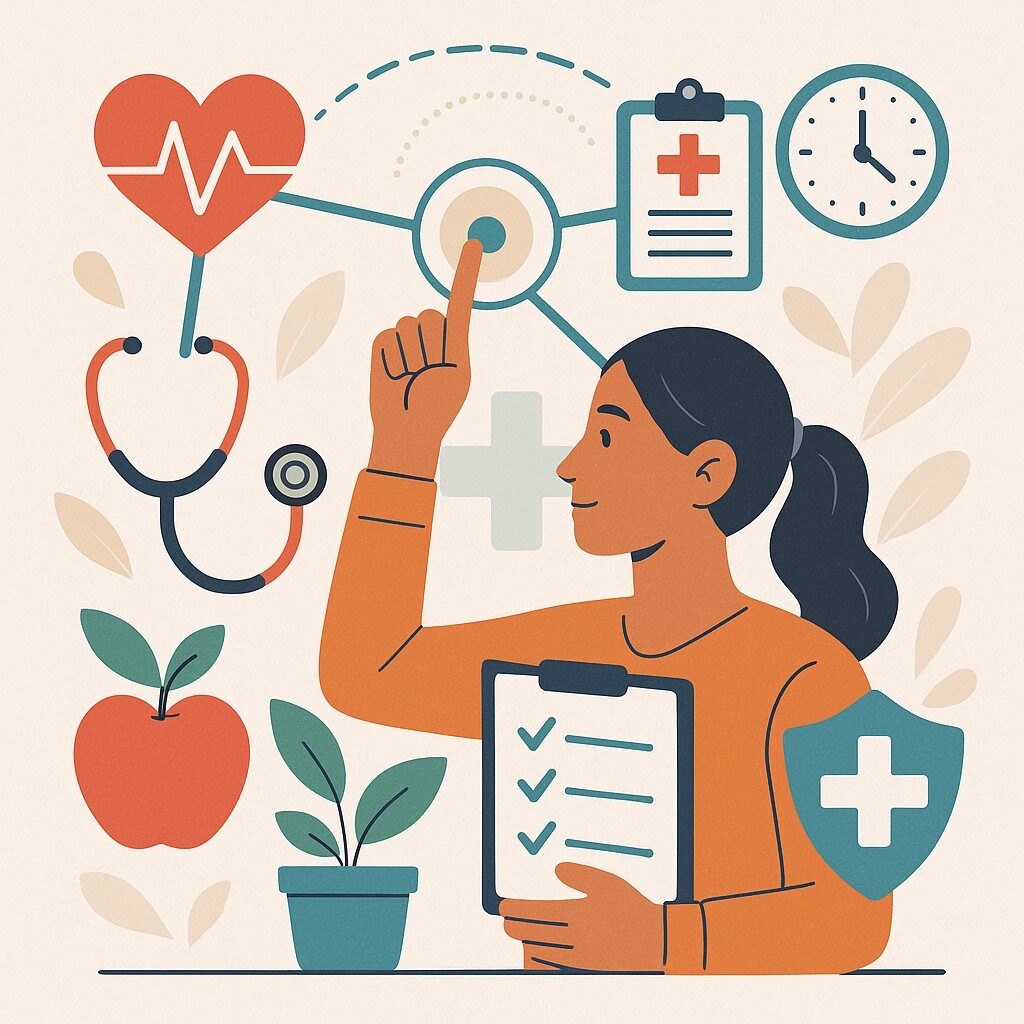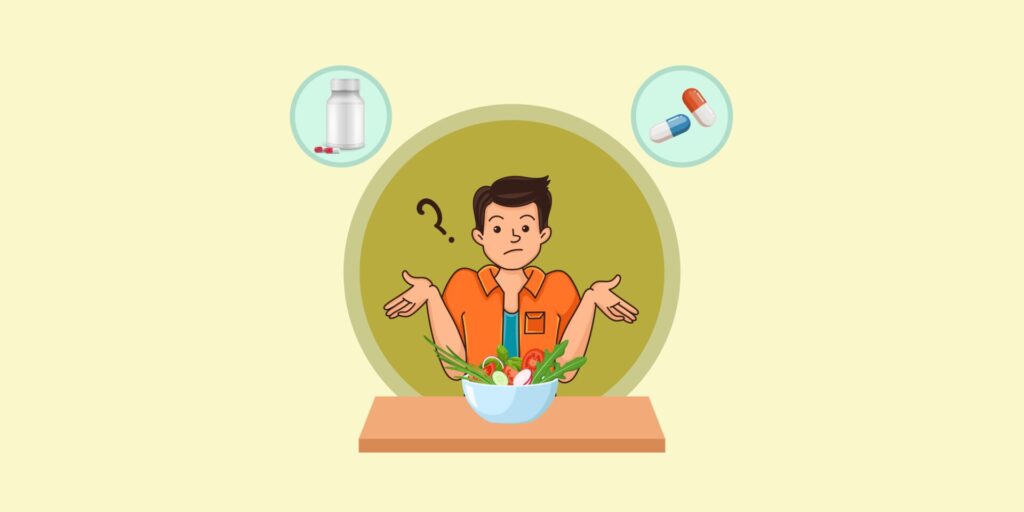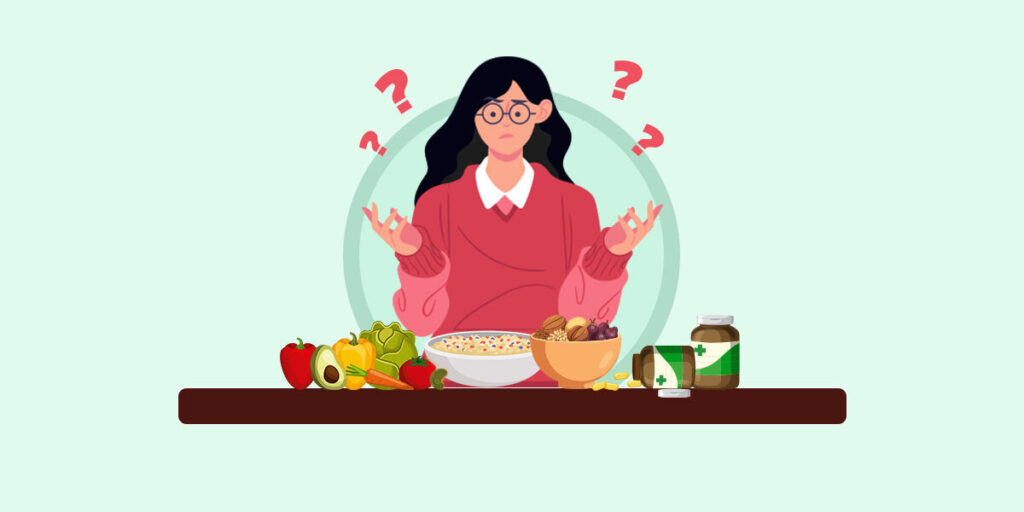Vitamins B12 and D are crucial for maintaining health, yet many people suffer from a shortage of one or both without realising it. Both play vital roles in energy, immunity, bone strength, and neurological health. Let’s understand why they matter, how to recognise their symptoms, and the best ways to prevent and manage these deficiencies.
Essential Roles of Vitamin B12 in Health
Vitamin B12 plays several essential roles in maintaining overall health.
- It is crucial for the development and function of the central nervous system, supporting the health of nerve cells and brain function. This helps maintain cognitive abilities and neurological health.
- Vitamin B12 is vital for red blood cell formation.
- It is a key factor in DNA synthesis and regulation, important for cell division and genetic material maintenance, which impacts every tissue in the body.
- It plays a role in maintaining mood and mental well-being, potentially preventing depression and cognitive decline.
- Adequate Vitamin B12 is especially important during pregnancy to prevent birth defects and promote healthy fetal development.
Causes of Vitamin B12 Deficiency
Dietary Factors
Vitamin B12 is a vital nutrient that is not naturally found in many plant-based foods. People who follow diets based mainly on plants often face challenges getting enough B12 unless they include foods fortified with this vitamin or take supplements. Without these sources, their bodies may gradually run low on B12, since the vitamin is crucial for energy, brain function, and blood health.
Lifestyle Factors
Certain lifestyle habits can influence how well vitamin B12 is absorbed and maintained in the body. For example, urban living often means less natural sunlight and potentially less exposure to fresh air and varied diets. Although sunlight primarily helps the body produce vitamin D, a healthy lifestyle with balanced eating supports overall well-being and efficient vitamin absorption.
Symptoms of Vitamin B12 Deficiency

Key clinical signs of Vitamin B12 deficiency.
- Fatigue, weakness, and lightheadedness due to anemia caused by impaired red blood cell production.
- Pale or yellowish skin (jaundice) from anemia and red blood cell destruction.
- Shortness of breath, heart palpitations due to decreased oxygen transport.
- Loss of appetite, digestive issues, and diarrhea.
- Numbness, tingling, or “pins and needles” in hands and feet.
- Difficulty with balance, coordination, or walking steadily.
- Memory problems, confusion, or trouble concentrating (“brain fog”).
These symptoms may start mildly but can worsen if left untreated, so it’s important to get checked if they persist.
Who Is at Risk
High-Risk Groups by Age and Gender
As people grow older, their bodies become less efficient at absorbing vitamin B12, making adults over 60 years of age more likely to experience deficiency. Aging can slow down digestion and reduce the stomach’s ability to produce the substances needed to absorb B12 properly. Additionally, women – especially those with certain autoimmune conditions or family history—may also be more vulnerable to deficiency. While both men and women can be affected, studies have shown men might sometimes have a higher risk due to different biological factors. It’s important to recognise that B12 deficiency can develop slowly, sometimes without clear symptoms, so regular check-ups become crucial as we age.
Special Considerations for Vegetarians and Vegans

People who primarily eat plant-based diets often do not get enough vitamin B12 naturally through food, because this vitamin is scarce in most plant foods unless they are specially fortified. For those following these diets, it becomes essential to find alternative sources such as fortified foods or supplements. Without these, vitamin B12 stores in the body can gradually deplete, leading to symptoms over time. Being mindful of this can help prevent deficiency and maintain good energy and brain health.
The Impact of Urban Lifestyle on Vitamin Levels
Living in cities or urban environments can influence vitamin levels in several ways. Often, people spend much of their time indoors because of work or lifestyle, which reduces exposure to natural sunlight – vital for the body’s production of vitamin D. This lack of sunlight can indirectly affect energy and mood. Urban diets might also be less varied or rely heavily on processed foods, sometimes lacking in essential nutrients including vitamin B12 if not carefully planned. Busy schedules and stress can further impact digestion and nutrient absorption. Adopting small lifestyle changes, like spending time outdoors or choosing nutrient-rich foods, can make a big difference in maintaining healthy vitamin levels.
Best Dietary Sources for Vitamin B12

Here are the best plant-based dietary sources of Vitamin B12.
- Fortified Plant-Based Milks (such as soy milk, almond milk, oat milk).
- Fortified Breakfast Cereals
- Tempeh (fermented soy product, contains some B12 from fermentation).
- Shiitake Mushrooms (contain small amounts of B12, especially when dried).
- Nutritional Yeast (this deactivated yeast is often fortified with Vitamin B12 and has a cheesy flavor, making it a perfect addition to vegan dishes).
- Curry Leaves (Kadi Patta, while not a major source of Vitamin B12, curry leaves, commonly used in Indian cooking, have small amounts of this vitamin, especially when used in their fresh form).
- Moringa Leaves (Moringa, known for its high nutrient profile, contains small amounts of Vitamin B12).
- Yogurt (Especially homemade dahi, is a great source of Vitamin B12).
- Paneer (A popular Indian dairy product, paneer, is not only a good source of protein but also provides Vitamin B12).
- Indian cheeses like chhena (used to make sweets like rasgulla and sandesh) also provide small amounts of B12.
- Lassi (this traditional Indian yogurt drink is another excellent source of Vitamin B12).
These foods are either naturally containing vitamin B12 due to fermentation or fortified with added B12 to help plant-based eaters meet their nutritional needs.
Prevention and Lifestyle Strategies

Here are prevention and lifestyle strategies for maintaining healthy Vitamin B12 levels.
- Have regular health check-ups to monitor vitamin B12 levels and catch deficiencies early.
- Manage digestive health by treating gut-related issues that can affect vitamin absorption.
- Limit alcohol consumption and avoid smoking to protect digestive and overall health.
- Practice stress-reducing activities like yoga, which can improve digestion and overall well-being.
- Engage in regular physical exercise to improve circulation and boost energy levels.
- Incorporate breathing exercises and relaxation techniques (often part of yoga) to support nervous system health.
Incorporating yoga and exercise complements nutritional strategies by promoting digestive health, reducing stress, and enhancing overall vitality, thereby helping maintain adequate vitamin B12 levels.
Essential Roles of Vitamin D in Health
Vitamin D plays essential roles in keeping the body healthy.
- Vitamin D helps the body absorb calcium and phosphorus from food, which are the building blocks for healthy, strong bones.
- Vitamin D helps the body defend itself against infections by supporting immune cell function, making it easier to fight off viruses and bacteria.
- Adequate vitamin D helps muscles stay strong and prevents weakness or pain, especially important as we age.
- Vitamin D reduces inflammation in the body, which can protect against chronic diseases like heart disease and diabetes.
- Vitamin D influences brain function and may help protect against mood disorders such as depression and cognitive decline.
Known as the “sunshine vitamin,” Vitamin D helps regulate calcium and phosphorus absorption, keeping bones strong and the immune system active.
Causes of Vitamin D Deficiency
Dietary Factors
Vitamin D is naturally found in only a few foods, and most people don’t get enough from diet alone. Many common plant-based foods do not naturally contain vitamin D unless they are specially fortified. Without regular consumption of fortified foods like plant-based milks, breakfast cereals, and supplements, it’s easy to fall short of the vitamin D needed for good health.
Lifestyle Factors
The most common cause of vitamin D deficiency is not getting enough sunlight. When sunlight hits the skin, it triggers the body to make vitamin D naturally. People who stay indoors most of the time, live in cities with tall buildings blocking sunlight, or live in northern climates with less sun exposure can miss out on this important source.
Wearing clothes that cover most of the body or using sunscreen often also reduces the skin’s ability to make vitamin D from sunlight. Older adults and people with darker skin tones may need more sun exposure because their skin is less efficient at producing vitamin D.
Symptoms of Vitamin D Deficiency

Here are the key symptoms of Vitamin D deficiency.
- Fatigue and ongoing tiredness even after adequate rest.
- Bone pain and aches, especially in the lower back, ribs, or legs.
- Muscle weakness and cramps, making it hard to move comfortably.
- Mood changes such as depression, anxiety, or feeling down.
- Slow wound healing and easy bruising.
- In children, delayed growth or bowed legs caused by soft bones (rickets).
- In adults, soft bones and increased risk of fractures due to bone weakening.
Many people with vitamin D deficiency may not notice symptoms at first, as they can be mild or mistaken for other issues.
Who Is at Risk
High-Risk Groups by Age and Gender
As people get older, their skin becomes less efficient at producing vitamin D from sunlight. This means adults over 65 years of age are more likely to have low vitamin D levels, which can lead to weak bones and muscle issues. Interestingly, some studies show younger adults, especially those aged 30-50, can also have a higher risk, partly because they may spend more time indoors and have less healthy diets. Women, especially younger women in certain cultures, tend to have higher vitamin D deficiency rates compared to men. This can be due to lifestyle factors, clothing choices, and lower intake of vitamin D-rich foods or supplements.
Special Considerations for Vegetarians and Vegans

For those who do not consume animal products, vitamin D intake from food can be limited because many natural sources of vitamin D are animal-based. While sunlight is a primary source, limited outdoor time or living in areas with little sunshine can increase deficiency risk. Vegetarians and vegans should pay attention to consuming fortified plant-based milk, cereals, and possibly consider supplements to meet their vitamin D needs.
The Impact of Urban Lifestyle on Vitamin Levels
Living in a city often means spending most of the time indoors – whether at work, home, or commuting – and this limits sun exposure, essential for the body to make vitamin D naturally. Busy urban lifestyles can also mean less time for physical activity outdoors. Tall buildings, pollution, and weather can block sunlight further. Additionally, habits like wearing sunscreen or covering most of the skin reduce vitamin D production. These combined factors make people in urban environments especially vulnerable to vitamin D deficiency.
Best Dietary Sources for Vitamin D
Here are the best dietary sources of Vitamin D.
- Fortified Foods (such as soy milk, almond milk, oat milk).
- Fortified Orange Juice
- Fortified Plant-Based Yogurt
- Amaranth (Rajgira, often used in Indian fasting foods) is a plant-based source of Vitamin D.
- Fortified Cow’s Milk (while regular milk is a source of calcium, Vitamin D is often added through fortification).
Here are some additional tips for Vitamin D Absorption.
- Sun Exposure: While diet plays a key role, direct sunlight is one of the best natural sources of Vitamin D. A few minutes of sun exposure each day (especially in the morning) can help your body produce Vitamin D.
Since Vitamin D is primarily found in animal products, those following a plant-based diet may need to rely on fortified foods or supplements to meet their daily Vitamin D requirements.
Prevention and Lifestyle Strategies

Here are effective prevention and lifestyle strategies to maintain healthy Vitamin D levels.
- Aim for short periods (about 10-30 minutes) of direct sunlight on arms and legs several times a week, depending on skin tone, location, and season.
- Regular physical activity like walking, cycling, or yoga helps overall health and can support vitamin D metabolism.
- Treat disorders like digestive problems or kidney and liver diseases that affect vitamin D absorption or processing.
- Sunscreen blocks vitamin D synthesis, so it’s helpful to expose skin briefly without sunscreen before applying it during longer outdoor activities.
Following these steps can significantly reduce the risk of vitamin D deficiency and promote strong bones, healthy muscles, and overall wellness.
Frequently Asked Questions
Can Vitamin B12 and Vitamin D deficiency happen together?
Yes, many people experience both deficiencies at the same time, especially vegetarians and those with limited sun exposure.
Are vegetarians and vegans at higher risk for these deficiencies?
Yes, they are particularly at risk for Vitamin B12 deficiency because it is naturally found mainly in animal-based foods. Vegans should consume fortified foods or supplements.
Can Vitamin B12 and D deficiency affect mental health?
Yes, deficiencies in both vitamins have been linked to symptoms such as depression, anxiety, cognitive decline, and in some cases, subjective cognitive complaints.
Can these deficiencies be treated and reversed?
With early diagnosis, Vitamin B12 and D deficiencies are treatable with dietary changes and supplements. Long-term untreated deficiency, especially Vitamin B12, can cause irreversible nerve damage, so early intervention is important.
What is the daily requirement of Vitamin D and B12?
On average, adults need 2.4 mcg of Vitamin B12 and 600–800 IU of Vitamin D daily. Needs vary depending on age, health, and lifestyle.
Conclusion: The Importance of Proactive Health Management

Taking a proactive approach to health means focusing on prevention, early detection, and maintaining overall well-being before serious problems arise. For vitamins like B12 and D, this approach is especially crucial because deficiencies can develop slowly and silently but lead to significant health issues if unnoticed.
Staying ahead with informed choices and preventive care is the best way to safeguard health, maximising longevity and well-being for the future. For anyone looking to boost their vitamin health and overall well-being, Habuild offers a Free 14-Day Online Yoga Program designed to energise the body and mind.






